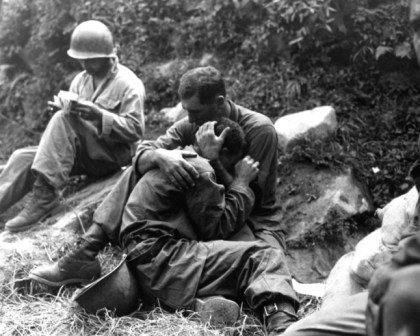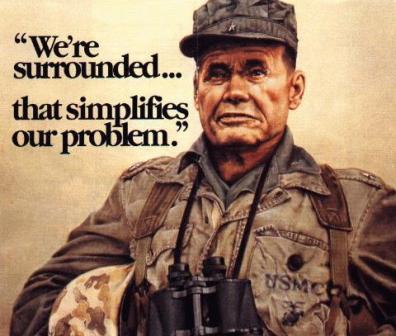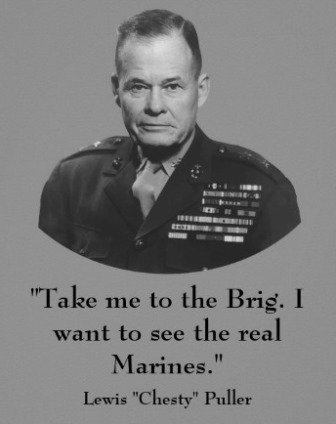July 28, 2013, - 11:00 pm
Remember Lt. Gen. “Chesty” & All the Brave US Men Who Risked, Gave Their Lives in Korea
As you may know, yesterday was the 60th anniversary of the armistice in Korea. And I can’t let the weekend get away without recognizing the sacrifices of our brave American men who fought–many of them giving their lives–in the Korean War. It’s been called “the forgotten war” because World War II and Vietnam get more attention on either end of it. And that’s true. The only time you really hear about the Korean War, these days, is when it’s mentioned on “Mad Men” (Don Draper/Dick Whitman is a Korean War Vet). But 36,574 American troops died there, and it was a noble fight.

U.S. Infantryman Weeps on Shoulder of GI in Korea, After His Friend is KIA, While Corpsman Fills Out Casualty Tags, August 28, 1950
Because of us, South Korea is safe, secure, and free today, and is a Western industrialized democracy that isn’t under the control of Communist nutjobs from the Kim family. It wasn’t a pointless war in which we shed American blood to hand out candy to and build roads for Muslims who hate us (Afghanistan) or a pointless war in which thousands of American boys died to hand a country from one sect of America-hating Muslims to another sect of America-hating Muslims (Iraq and–if crazies like John McCain get their way–Syria). Americans, South Koreans, and a coalition of others staved off Communists from China, North Korea, and the Soviet Union and dominated the Korean Peninsula. Today, 28,500 American troops remain on guard in South Korea, something the Rand Paulistinians and Justin (H)AMAShes of the world and their crazy libertarian Tea Party lemmings wish would end (so North Korea could take over).
One of the greatest Korean War veterans–and one of its finest leaders and commanders in battle–was the great Lt. Gen. Lewis “Chesty” Puller, the most highly decorated Marine in U.S. history. He’s been called “the Marine’s Marine”–for good reason. If only we had more men like him leading the military today. Historian Amanda Foreman wrote a fantastic tribute to Chesty, who may not be known to you–but should be–in Saturday’s Wall Street Journal.

The 2½-mile-wide demilitarized zone that separates North and South Korea was officially established on July 27, 1953. To some, the DMZ’s existence is another reason not to dwell on the war. But to others, it is an emblem of the hard-won peace that has since endured—a peace that was achieved with the help of men like Lt. Gen. Lewis “Chesty” Puller, the most highly decorated Marine in U.S. history.
Puller, who died in 1971, may be little known outside of the Marine Corps. But his name lives on among the men and women who serve. At any Marine base around the world, the close of day is often greeted with the cry, “Goodnight, Chesty Puller, wherever you are.”
Puller was in his early 50s when the Korean War began and already a legend in the Corps. He was old-style, the kind of soldier who insisted on leading his men from the front. In November 1950, Chesty was given command of the 1st Marine Division and dispatched to a remote area in North Korea known as the Chosin Reservoir.
As related in Jon T. Hoffman’s “Chesty
,” the Marines barely had time to set up base camp when the Chinese People’s Liberation Army attacked their position. The embedded journalists immediately confronted Chesty, demanding to know his plan. Calmly he replied: “We’ve been looking for the enemy for several days now. We’ve finally found them. We’re surrounded. That simplifies our problem of finding these people and killing them.”
His bravado wasn’t simply for show. Chesty always stationed himself wherever the fighting was at its fiercest. At Chosin, the heat of action was around the base perimeter. When a frightened major dared to ask about the line of retreat, Chesty radioed the base’s artillery commander and ordered him to fire on any soldier who abandoned his position; then he turned back to the unfortunate officer and said, “That answer your question? There will be no withdrawal.”
The “Chesty effect” on the division was palpable. A battalion commander recalled: “Puller gave us pride in some way I can’t describe. All of us had heard hundreds of stories about him. He kept building up our morale higher and higher, just by being there.”
On Dec. 6, 1950, Chesty was ordered to break out of Chosin Reservoir and open an escape route to Hungnam port. The 80,000-strong PLA was no longer the only enemy confronting the Marines. By now the temperature had dropped to 25 degrees below zero. Fighting every step of the way, Chesty succeeded in not just bringing out the wounded and the dead but also every vehicle and piece of equipment worth saving. Behind him, spread out for miles, lay the broken remnants of seven Chinese divisions.
In his inimitable way, Chesty refused to call the retreat a defeat, let alone a retreat. As the general waited to board his ship, he ordered reporters to “Remember, whatever you write, this was no retreat. All that happened was we found more Chinese behind us than in front of us. So we about-faced and attacked.” The Navy rewarded Chesty for Chosin Reservoir with his fifth Navy Cross.
With a resurgent North Korea under Kim Jong Un once again threatening to destabilize the region, it is worth remembering that weapons are important but leaders like Lewis “Chesty” Puller are priceless.
AMEN. Chesty’s wartime quotes are legendary.

Remember Chesty and all the great men who risked (and the many who gave) their lives on the battlefield in Korea. They did what it took to make America great and proud. May G-d Bless Them All.
Get Yours . . .
Tags: 60th anniversary of Korean Armistice, Chesty, Chesty Puller, Korea, Korean Armistice, Korean War, Lt. Gen. Lewis "Chesty" Puller, Marines, US Marine Corps, USMC


Not to detract from what any of the veterans in the field, or the leadership of that time, did, but, I have to ask, after all these years, why isn’t South Korea capable of defending itself without U.S. troops being stationed there? 60 years isn’t enough time to build some armed forces and be prepared? Or are all their resources and people needed to do the factory jobs that have been outsourced there from the U.S.?
RT: You raise good points. But, by your logic and standards here, we should probably pull out of Japan completely, Germany, Italy, and most other places where we have troops. Should we really have no international military presence? If so, then perhaps you agree with Barack Obama’s dangerous shrinking of the military. Do you? DS
RT on July 28, 2013 at 11:14 pm